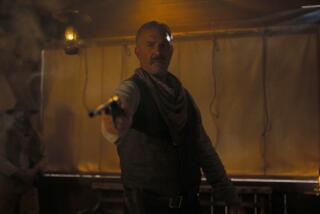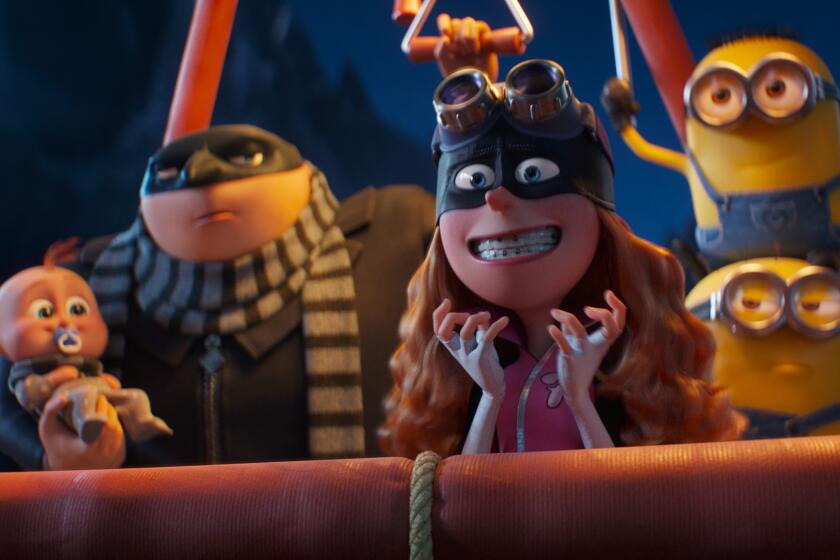MOVIE REVIEW : Belmondo Steals Show in Weighty ‘Miserables’
Claude Lelouch’s extravagant melodrama “Les Miserables” is neither a film of the musical nor the umpteenth remake of the Victor Hugo novel, but rather an epic saga of an Everyman whose life parallels that of the hapless Jean Valjean as it embodies the history of France in the turbulent first half of the 20th Century. No new Lelouch film has made it to American screens for nearly a decade, but he proves to be just as passionate, swooningly romantic a filmmaker as ever.
That’s not the case with his star, Jean-Paul Belmondo, who hasn’t been seen in a new film in the United States for about 20 years. Belmondo still has the magnetism, the easy masculine authority that brought him international renown some 35 years ago with “Breathless.” Belmondo remains rugged and reasonably trim but his face is deeply creased. Just past 60 when he made this film, he looks his age, even though for most of the film he plays a man between 45 and 50. What the heck, Belmondo’s Henri Fortin has had the tough kind of life that will age you fast enough; besides, seeing Belmondo in action after such a long time is the best and ultimately only reason for sitting through this tempestuous near-three-hour chronicle.
Like most Lelouch films, his “Les Miserables” is energetic, emotion-charged, flashy and drenched in thundering Liberace-like piano crescendos while expressing his by now, rather touching belief in an intensely schematic working of coincidence and fate. Life for Lelouch may be filled with drastic ups and downs but by golly, it proceeds like clockwork, striking a perfect balance between the eternal cycle of joy and sorrow.
Somewhere around the film’s halfway point Belmondo’s Fortin, an illiterate ex-boxer turned furniture mover who becomes obsessed with the legend of Jean Valjean, watches the 1934 version of “Les Miserables” with the great Harry Baur as Valjean. “The second half of the film is a bit much--it’s over the top,” he says later, an appraisal that applies perfectly to this “Les Miserables.”
For quite awhile Lelouch’s impassioned observation of the working of fate is fun but eventually becomes needlessly drawn-out, lapsing into the mechanical in the process. As the century turns, 5-year-old Henri’s father (also Belmondo) is wrongly convicted of murder, reducing his mother to prostitution. As his parents meet their grim fates, little Henri grows up to be a champion boxer, quite literally at the stroke of the World War I armistice.
Jumping ahead to the increasingly perilous ‘30s, Henri, an apparently happy-go-lucky furniture mover, is transformed by the simultaneous discovery of “Les Miserables,” which he has to have read to him, and by meeting the Zimans, a Jewish couple who are fleeing Paris and who have hired Fortin to move their furniture to a large old house in Normandy.
Betrayed in their attempt to flee to Switzerland, Mons. Ziman (Michel Boujenah) ends up being hidden by a farm couple (Annie Girardot, Philippe Leotard), Madame Ziman (Alessandra Martines), a famous ballerina, falls into the clutches of the Nazis, but Henri has managed to place their little daughter Salome (Salome Lelouch, the director’s daughter) in the safety of a beatific Micheline Presle’s Catholic convent.
Lelouch milks interminably the question as to whether the Zimans will survive the war and be reunited, and it involves a contrived and protracted change of heart by Girardot and Leotard toward Ziman. An exhausting cross-cutter, Lelouch throws in more subplots and developments than can be described here and inserts several vignettes--famous scenes from the actual “Les Miserables,” one of which provides a delightful cameo by Jean Marais as the priest whose spirit of generosity and kindness changes Jean Valjean’s life.
At all times, “Les Miserables” is a spectacular-looking film with those great settings and costumes that are a hallmark of French period films. In well-drawn parts, the cast is staunch--as it has to be to bear up under this weighty endeavor--but Belmondo, even though off the screen for several considerable stretches, easily walks away with the picture.
* MPAA rating: R, for violence, brief language and sexuality. Times guidelines: The film has many harrowing passages too intense for small children but acceptable for older children accompanied by an adult.
(BEGIN TEXT OF INFOBOX / INFOGRAPHIC)
‘Les Miserables’
Jean-Paul Belmondo: Henri Fortin
Michel Boujenah: M. Ziman
Alessandra Martines: Madame Ziman
Annie Girardot: Farmer’s wife
Philippe Leotard: Farmer
Salome Lelouch: Salome
A Warner Bros. release of a Les Films 13/TFI Films production with the participation of Canal Plus. Writer-producer-director-cinematographer Claude Lelouch. Lighting director Philippe Pavans de Ceccatty. Editor Helene de Luze. Costumes Dominque Borg. Music Francis Lai, Didier Barbelivien, Philippe Servain, Erik Berchot and Michel Legrand. Art director Jacques Bufnoir. Set designer Laurent Tesseyre. Production design Ina Mayhew. Set decorator Pascal Morin. In French, with English subtitles. Running time: 2 hours, 54 minutes.
* Exclusively at the Westside Pavilion, 10800 Pico Blvd., West Los Angeles, (310) 475-0202.
More to Read
Only good movies
Get the Indie Focus newsletter, Mark Olsen's weekly guide to the world of cinema.
You may occasionally receive promotional content from the Los Angeles Times.






